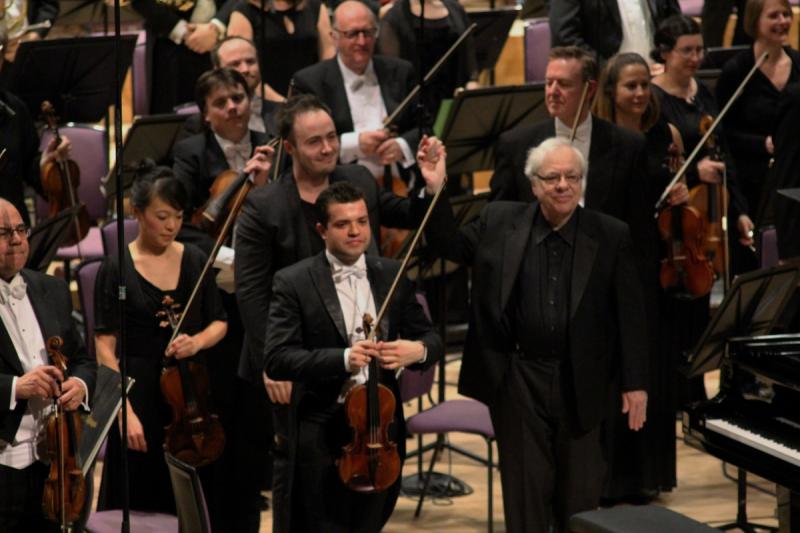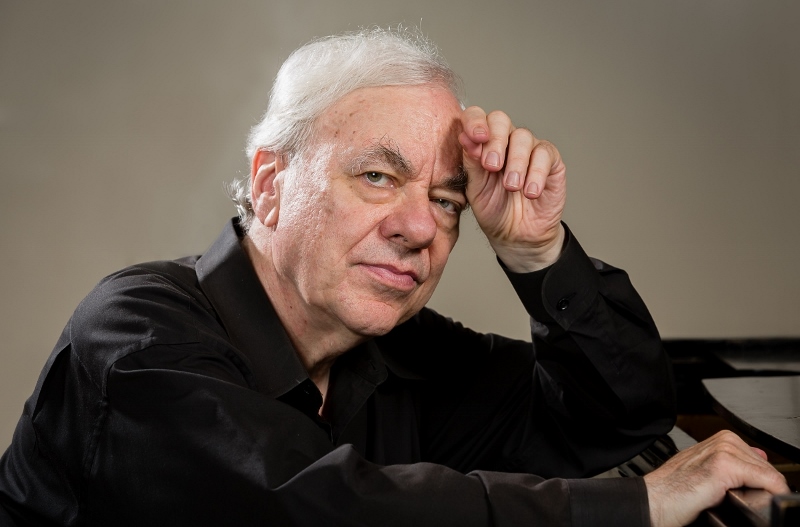Goode, BBC Philharmonic, Gernon, Bridgewater Hall, Manchester review – making beautiful music | reviews, news & interviews
Goode, BBC Philharmonic, Gernon, Bridgewater Hall, Manchester review – making beautiful music
Goode, BBC Philharmonic, Gernon, Bridgewater Hall, Manchester review – making beautiful music
Big programme for a youthful principal guest conductor, plus a pianist’s wisdom

Just over a year since his Bridgewater Hall début, Ben Gernon appeared with the BBC Philharmonic there again – this time well into his role as their Principal Guest Conductor, yet his first concert with them there since officially taking up the position.
But that’s still one of the main impressions of the way he works with the orchestra. He gives them what they need, no less and no more, and musicians of the calibre of the BBC Philharmonic (led, on this occasion, by George Tudorache) respond to that with playing of remarkable spirit and lovely tone. I don’t know how he does it, but, beyond helping them to shape their phrases simply and attractively, it’s as if he silently tells them – the strings in particular – they are going to make beautiful music together … and they do.
 It was a big programme for a young conductor, beginning with a UK premiere, continuing with a deep and subtle Mozart piano concerto, and ending with Mahler’s first symphony. Soloist in the Mozart Piano Concerto No. 20 in D minor was Richard Goode (pictured left), whose wisdom of years complemented Gernon’s accompanimental skills very effectively. His playing is even, mostly restrained, using the resources of the concert grand piano sparingly but eloquently, but with enough weight and drama for Beethoven’s cadenzas to seem thoroughly in keeping with the concerto’s sound world, though just a little showy and (in the case of the finale) like a little Romantic concerto, and nobly done.
It was a big programme for a young conductor, beginning with a UK premiere, continuing with a deep and subtle Mozart piano concerto, and ending with Mahler’s first symphony. Soloist in the Mozart Piano Concerto No. 20 in D minor was Richard Goode (pictured left), whose wisdom of years complemented Gernon’s accompanimental skills very effectively. His playing is even, mostly restrained, using the resources of the concert grand piano sparingly but eloquently, but with enough weight and drama for Beethoven’s cadenzas to seem thoroughly in keeping with the concerto’s sound world, though just a little showy and (in the case of the finale) like a little Romantic concerto, and nobly done.
Ben Gernon did not rush the opening, but kept it gentle, mysterious and tense, making a clear contrast with its first big outburst, and keeping an alternation of assertion and foreboding in what followed. The Romanza middle movement had a sense of late 18th century “sensibility”, Richard Goode’s playing charmingly faux-naif but implying deep feeling, and in perfect proportion in each repetition of the opening. In the finale there was lightness of step, but tension rarely departed, even in the touches of light relief that Mozart, wisely, gave it.
The UK premiere was of Anna Clyne’s The Midnight Hour, written three years ago for l’Orchestre National d’Île-de-France during her residency with them. It’s not a typical nocturne: it starts with a bang, ends with a bang (on bass drum), and in between is mainly fast and furious. But it’s very accessible music, with recognisable chords, repetition of coherent units within its themes, reprises of some important sections, and the instrumentational ability to make even a straight unison sound thrilling. It’s also at times quite filmic in style, with a big tune in string octaves, folksy woodwind solos, and a slow, sentimental role for two trumpets, either side of the stage, with very traditional harmonies to accompany them. It’s also got some effective brass and woodwind chorus writing, which Ben Gernon balanced with skill.
 So to Mahler’s First Symphony. This may not have been one of the most monumental readings ever, but it reminded you – often dramatically – that the symphony is a young composer’s work, one who was even a bit younger, when he wrote most of it, than the youthful conductor we saw presenting it. Gernon (pictured right) captured the sense of anticipation in its opening, his accelerations were energetic and in-yer-face, contrasting with tenderness in the string playing. But momentum was sustained, along with clear, near-raucous, nature painting in the open-air passages.
So to Mahler’s First Symphony. This may not have been one of the most monumental readings ever, but it reminded you – often dramatically – that the symphony is a young composer’s work, one who was even a bit younger, when he wrote most of it, than the youthful conductor we saw presenting it. Gernon (pictured right) captured the sense of anticipation in its opening, his accelerations were energetic and in-yer-face, contrasting with tenderness in the string playing. But momentum was sustained, along with clear, near-raucous, nature painting in the open-air passages.
Gernon brought some stridency to the climax of the first movement, and weight of sound to the lively second. The surreal third movement (with Frère Jacques in the minor mode) was finely balanced, so that each voice could be heard singing its part in the canon, and there was an admirably sleazy swing to the klezmer music sections.
The finale began almost hysterically but soon presented a glowing vision of a better world, Gernon’s grip on the rhythms also giving coherence to the most crowded textures and clarity to the structure. The final peroration firmly kept its head, and the BBC Philharmonic’s sonic brilliance was its outstanding quality.
rating
Share this article
The future of Arts Journalism
You can stop theartsdesk.com closing!
We urgently need financing to survive. Our fundraising drive has thus far raised £49,000 but we need to reach £100,000 or we will be forced to close. Please contribute here: https://gofund.me/c3f6033d
And if you can forward this information to anyone who might assist, we’d be grateful.

Subscribe to theartsdesk.com
Thank you for continuing to read our work on theartsdesk.com. For unlimited access to every article in its entirety, including our archive of more than 15,000 pieces, we're asking for £5 per month or £40 per year. We feel it's a very good deal, and hope you do too.
To take a subscription now simply click here.
And if you're looking for that extra gift for a friend or family member, why not treat them to a theartsdesk.com gift subscription?
more Classical music
 Hallé John Adams festival, Bridgewater Hall / RNCM, Manchester review - standing ovations for today's music
From 1980 to 2025 with the West Coast’s pied piper and his eager following
Hallé John Adams festival, Bridgewater Hall / RNCM, Manchester review - standing ovations for today's music
From 1980 to 2025 with the West Coast’s pied piper and his eager following
 Kaploukhii, Greenwich Chamber Orchestra, Cutts, St James's Piccadilly review - promising young pianist
A robust and assertive Beethoven concerto suggests a player to follow
Kaploukhii, Greenwich Chamber Orchestra, Cutts, St James's Piccadilly review - promising young pianist
A robust and assertive Beethoven concerto suggests a player to follow
 Robin Holloway: Music's Odyssey review - lessons in composition
Broad and idiosyncratic survey of classical music is insightful but slightly indigestible
Robin Holloway: Music's Odyssey review - lessons in composition
Broad and idiosyncratic survey of classical music is insightful but slightly indigestible
 Classical CDs: Wolf-pelts, clowns and social realism
British ballet scores, 19th century cello works and contemporary piano etudes
Classical CDs: Wolf-pelts, clowns and social realism
British ballet scores, 19th century cello works and contemporary piano etudes
 Bizet in 150th anniversary year: rich and rare French offerings from Palazzetto Bru Zane
Specialists in French romantic music unveil a treasure trove both live and on disc
Bizet in 150th anniversary year: rich and rare French offerings from Palazzetto Bru Zane
Specialists in French romantic music unveil a treasure trove both live and on disc
 Scottish Chamber Orchestra, Ibragimova, Queen’s Hall, Edinburgh review - rarities, novelties and drumrolls
A pity the SCO didn't pick a better showcase for a shining guest artist
Scottish Chamber Orchestra, Ibragimova, Queen’s Hall, Edinburgh review - rarities, novelties and drumrolls
A pity the SCO didn't pick a better showcase for a shining guest artist
 Kilsby, Parkes, Sinfonia of London, Wilson, Barbican review - string things zing and sing in expert hands
British masterpieces for strings plus other-worldly tenor and horn - and a muscular rarity
Kilsby, Parkes, Sinfonia of London, Wilson, Barbican review - string things zing and sing in expert hands
British masterpieces for strings plus other-worldly tenor and horn - and a muscular rarity
 From Historical to Hip-Hop, Classically Black Music Festival, Kings Place review - a cluster of impressive stars for the future
From quasi-Mozartian elegance to the gritty humour of a kitchen inspection
From Historical to Hip-Hop, Classically Black Music Festival, Kings Place review - a cluster of impressive stars for the future
From quasi-Mozartian elegance to the gritty humour of a kitchen inspection
 Shibe, LSO, Adès, Barbican review - gaudy and glorious new music alongside serene Sibelius
Adès’s passion makes persuasive case for the music he loves, both new and old
Shibe, LSO, Adès, Barbican review - gaudy and glorious new music alongside serene Sibelius
Adès’s passion makes persuasive case for the music he loves, both new and old
 Anja Mittermüller, Richard Fu, Wigmore Hall review - a glorious hall debut
The Austrian mezzo shines - at the age of 22
Anja Mittermüller, Richard Fu, Wigmore Hall review - a glorious hall debut
The Austrian mezzo shines - at the age of 22
 First Person: clarinettist Oliver Pashley on the new horizons of The Hermes Experiment's latest album
Compositions by members of this unusual quartet feature for the first time
First Person: clarinettist Oliver Pashley on the new horizons of The Hermes Experiment's latest album
Compositions by members of this unusual quartet feature for the first time

Add comment